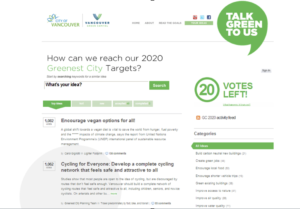It’s the beginning of the academic year for post-secondary students, and also the beginning of the application season for students who haven’t yet decided on their undergraduate or graduate degree programs. I thought it might be a good time to talk about planning as a course of study and career option; as a faculty member, I get a lot of inquiries about the programs at the Dalhousie School of Planning. I also feel that the understanding of planning in Atlantic Canada is somewhat limited, and that lots of people want to know what planners do and why we need planning in our communities.

Planning is a discipline that is broadly defined to include the organization and development of cities and regions in a sustainable way (economically, socially, and environmentally). For some people, the fact that every planner would define it differently is the root of the problem; for others, it’s what makes planning an amazing, inclusive, all-encompassing profession. Many people are uncomfortable with interdisciplinarity, intersectionality, and overlap. We live in a postmodern world where people often specialize in areas such as molecular biology, real estate development, and mechanical engineering, developing critical and very focused skill sets. Planning as a discipline has always run counter to that ideology. The roots of the planning field lie in urban and social reform, particularly in the areas of housing, workers’ rights and social justice, and public health. It has always been a discipline of disciplines; since the earliest days of the Town Planning Institute in Canada (founded in 1918), members of architecture, engineering or other professions could become planners. This is one reason why planners are uniquely poised to address many urban problems.
We forgot all of this once. In the 1940s and 1950s, planning became quite narrowly focused. As the ideals of modernism, through architecture, began to affect the planning field, sweeping changes occurred in our cities. We forgot the social, the community, the health, and turned to narrow, technical skills in physical planning and urban design as solutions to complex urban problems. We ended up with urban renewal, a disastrous direction that destroyed urban neighbourhoods and struck a blow to ethnic and low-income communities in urban centres. Communities launched a revolution, standing up to planners and opposing their schemes for new highways and modernist towers. They demanded that we consider the needs and desires of regular citizens, that we respect the fine-grained, well-designed neighbourhoods that had existed for decades. Many planners “switched sides”, working for communities in advocacy planning. We listened and responded to these demands for change. And the minute we forget that planning is rooted in community, in people, in health, and in human rights, we return to this era of darkness.
A planner is a professional who works with communities, governments, and individuals to improve urban and rural conditions. Planners work on a variety of different types of projects, such as developing urban design guidelines, reviewing development proposals, and developing community grants programs. They use skills such as policy analysis, facilitation of community meetings, GIS, data analysis, and collaboration with other organizations to produce documents such as project reports, briefing notes, official plans, and research papers. As planning educators, we foster these skills in our students so that they understand the planning framework and the spaces/times/opportunities for innovation and change. To become a registered planner in Canada, you have to complete an accredited degree in planning, gain appropriate work experience, and take a registration exam. It’s possible to become a planner without an accredited degree as well, with a longer work experience requirement and an additional exam. Planners work in a variety of settings in the public, private, and non-profit sectors, e.g. municipal government, planning and consulting firms, engineering firms, charitable organizations and non-profit housing authorities.

I tell my students that the great thing about planning is that there is a place for everyone. Students who choose to study planning are often interested in communities, organizations, and the environment. Generally, students who opt for a planning degree want to make their communities more sustainable, equitable, and efficient. Our students want to learn how to design streets that are safer for cyclists, develop outdoor education programs for youth in their community, or determine the types of land use policies that would make their city more sustainable. If you are a well-rounded student with skills and interests in ecology, civic or public administration, politics, cultural geography and history, and community engagement, you would enjoy planning. If you have done volunteer work in these areas, been politically active in your community, or attended meetings about urban development in your neighbourhood, planning is definitely for you!
